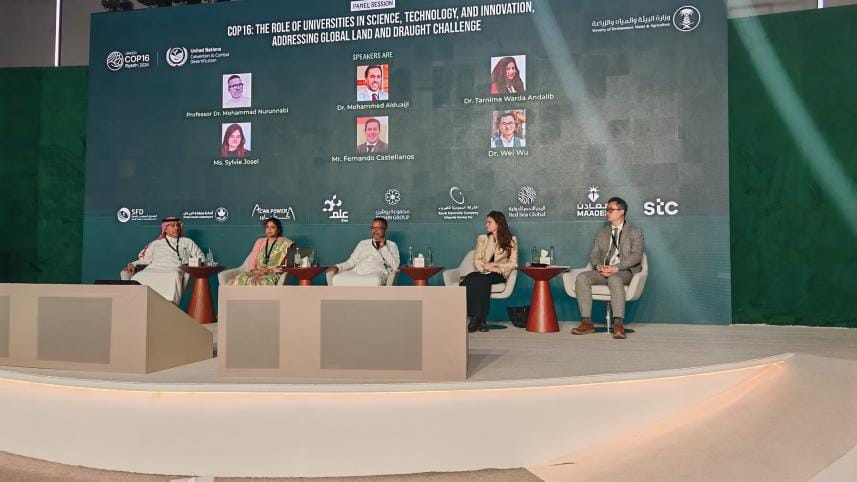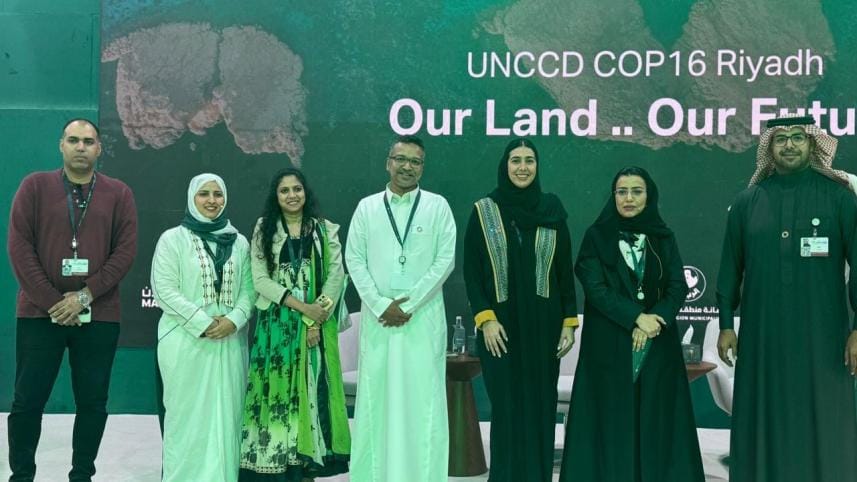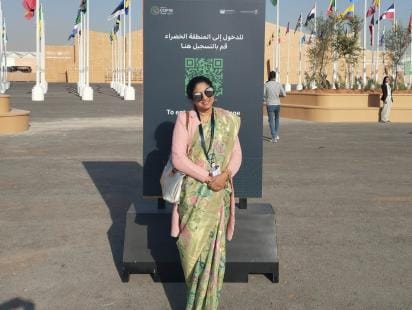An experience of a lifetime at COP16 in Riyadh

Last year, I was invited to the 16th session of the Conference of the Parties (COP16) to the United Nations Convention to Combat Desertification (UNCCD), held in Riyadh, Saudi Arabia, from December 2 to December 13, 2024. The theme of the session was "Our Land. Our Future". Since, I have been working as a global consultant director at Oxford Impact Group, Vision for Sustainable Africa sent the invitation and processed my visa and other necessary documents.
The COP16 was an inspiring convergence of global ambition, urgent climate dialogue, and cultural depth. The session brought together world leaders, climate scientists, policy experts, youth representatives, and grassroots activists under one roof to deliberate on the pressing climate challenges of our time. The atmosphere was both intense and hopeful, filled with high-stakes negotiations and groundbreaking commitments on issues such as climate finance, loss and damage, and sustainable development for the Global South.
I was a speaker at one of the formal panel discussions titled "The Role of Universities in Science, Technology and Innovation, Addressing Global Land and Draught Challenge". I came to meet a few brilliant minds in the panel discussion, where the Chief Speaker was Professor Mohammad Nurunnabi from Prince Sultan University in Riyadh, Saudi Arabia. He was the Founder and the President of Vision for Sustainability Africa as well as the Founding Director of Centre for Sustainability. Prof. Nurunnabi's brilliant innovative mind is continuously working with a pace that is simple mind blogging.

I also met Dr Mohammed Alduaiji, the Advisor Board Member of the Centre for Sustainability and Climate, Prince Sultan University, whose quintessential perceptions about the implementation of practical lab-oriented facilities in the universities were an extended version of what has been discussed in the past. I also got to meet Sylvie Josel, the Manager of Nature and Biodiversity at United Nations Global Compact, USA, whose insights were simply remarkable. There was also Dr Wei Wu from Shenzhen University, China, whose entrepreneurial thought processes had a great impact on my mind as well.
During the panel session, we discussed several challenges related to the panel's topic along with their mitigation techniques. The session was appreciated by the audience present there who mostly consisted of university faculty members, scientists, researchers, students, and top-level administrators.
The conference also provided an opportunity for me to observe Riyadh's transformation into a global sustainability hub for this event, which was simply remarkable. The city's blend of modern infrastructure and cultural heritage offered a unique setting that emphasised the importance of bridging tradition with innovation in climate solutions.
One particular moment that I really cherished during COP16 was the youth dialogue and discussion with Princess Layan Saud Al Faisal, a programme analyst at the United Nations Development Programme, Saudi Arabia Country Office, who has become an emerging voice in sustainability and environmental diplomacy in the region. Her presence was not only symbolic but deeply engaging.
Princess Layan vehemently advocated for human-centred climate action that amplifies the voice of young generations, especially from the MENA— Middle East and North Africa—region, a voice inadequately heard in global climate discussions. She emphasised integrating local and global science, and how Saudi Arabia is currently shifting the narrative from a fossil fuel economy to an active leader in renewables and carbon neutrality. She used the session to create open discussions, listen attentively to young people's adaptation and environmental justice concerns, and make statements about Saudi Arabia's Vision 2030 and its alignment with climate resilience goals.

For me, what stood out was Princess Layan's authenticity. A far cry from a ceremonial presence, she engaged us critically, acknowledging the gaps between policy-level commitment and grassroots-level realities. She called upon young delegates to not just raise awareness but also to effect tangible action at the level of their respective local communities, taking advantage of access and visibility that had been gained at COP16.
Besides, I also came across many other brilliant minds including Dr Malick, a brilliant chemist, Habib, a prolific researcher from Pakistan, Koudougou Rasmata, an amazing activist from Burkina Faso, and Tashi Wangdi, a thoughtful minister with exquisite research on environmental issues from Bhutan. I also met Syeda Rizwana Hasan, Adviser, Ministry of Environment, Forest and Climate Change and Ministry of Water Resources, Bangladesh and Secretary Dr Farina Ahmed from the Ministry of Environment, Forest and Climate Change. Their vision for Bangladesh was spoken out loud in one of the sessions as well.
This session, and the overall COP16 experience, reminded me that climate diplomacy is not just a series of talks but a human process of listening, accommodating, and envisioning. From being present in plenary halls where world-altering agreements were penned, to brainstorming with youth from all over the globe, each experience in Riyadh was one of learning. It has made me more determined to uphold climate justice and has convinced me that despite the fact that these are spaces traditionally controlled by bureaucracy, there is always space for voices such as ours to emerge and cause change.
Dr Tarnima Warda Andalib is an assistant professor at BRAC University.



 For all latest news, follow The Daily Star's Google News channel.
For all latest news, follow The Daily Star's Google News channel.
Comments